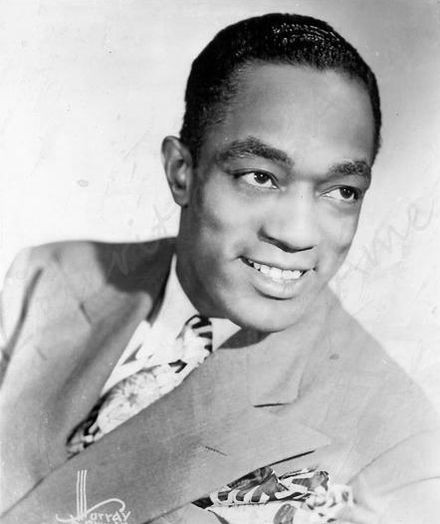


NEWS:
Only a few days left to hear our September stream - otherwise go to MixCloud to listen without detailed artist/gig info
Artist Info
|
Buddy Johnson  Image from Discogs  Buddy Johnson, (born Woodrow Wilson Johnson in Darlington, South Carolina, January 10, 1915 – New York, February 9, 1977) was an American jazz and blues pianist and bandleader, active from the 1930s through the 1960s. His songs were often performed by his sister Ella Johnson, most notably "Since I Fell for You" which later became a jazz standard. Buddy Johnson, (born Woodrow Wilson Johnson in Darlington, South Carolina, January 10, 1915 – New York, February 9, 1977) was an American jazz and blues pianist and bandleader, active from the 1930s through the 1960s. His songs were often performed by his sister Ella Johnson, most notably "Since I Fell for You" which later became a jazz standard.A prolific composer of rhythm and blues who stayed on the road in his bus playing well over 125 one nighters a year throughout the 1940’s thriving and surviving until finally slowing down in the latter 50’s. He first appeared on Decca's "race music" imprint in 1939, and he stayed with the label until 1953, then recording for Mercury until 1958, and his last album was on Roulette in 1958. When not on the road, or in the studio, he had a long standing gig at the Savoy Ballroom in New York City where his popular 17 member band held numerous box office records. Johnson's musical style was primarily swinging R&B directed towards black audiences, characterized by exhuberant, driving and danceable sounds, often aided by his little sister Ella on vocals or male singer Arthur Prysock who left for a solo career in 1952. His touring group at it's peak had 4 trumpets including Gil Askey, four trombones including Slide Hampton, five saxophones, string bass, guitar, drums and Johnson directing matters, often from the piano. As brassy big band R&B sounds fell out of favor, Johnson fought the times and kept a steady road retinue up, particularly in the south, but his sound was perhaps too sophisticated to ever crossover to the modern teeny bop rock n roll crowd. In 1950, at his commercial apex, he told an interviewer of his apathy about the music he had to play to please crowds "Personally I like the classics, but i can't eat classics." Johnson's band was known as the "Walk 'Em Rhythm" orchestra which desribed the relaxed pace that encouraged patrons to dance. His music was recorded by other artists as well including The Ink Spots, The Harptones, Lenny Welch, The Sonics, and Nina Simone. Johnson's death after a painful battle with a cancerous brain tumor in 1977 triggered an acrimonius legal battle for control of publishing that was lost by his sister and son vs a new common law wife he lived with near the end of his life in Georgia. Buddy's impoverished sister Ella Johnson who had sung numerous hit Buddy Johnson records and toured with him for two decades, received scant royalties, and lived in public housing until her death in 2004. from wikipedia: Johnson took piano lessons as a child, and classical music remained one of his passions. In 1938 he moved to New York, and the following year toured Europe with the Cotton Club Revue, being expelled from Nazi Germany. Later in 1939 he first recorded for Decca Records with his band, soon afterwards being joined by his sister Ella as vocalist. By 1941 he had assembled a nine-piece orchestra, and soon began a series of R&B and pop chart hits. These included "Let's Beat Out Some Love" (#2 R&B, 1943, with Johnson on vocals), "Baby Don't You Cry" (#3 R&B, 1943, with Warren Evans on vocals), his biggest hit "When My Man Comes Home" (#1 R&B, No. 18 pop, 1944, with Ella Johnson on vocals), and "They All Say I'm The Biggest Fool" (#5 R&B, 1946, with Arthur Prysock on vocals). Ella Johnson recorded her version of "Since I Fell for You" in 1945, but it did not become a major hit until recorded by Lenny Welch in the early 1960s. In 1946 Johnson composed a Blues Concerto, which he performed at Carnegie Hall in 1948. His orchestra remained a major touring attraction through the late 1940s and early 1950s, and continued to record in the jump blues style with some success on record on the Mercury label like "Hittin' on Me" and "I'm Just Your Fool". Rock and roll eventually halted Johnson's momentum, but his band (tenor saxophonist Purvis Henson was a constant presence in the reed section) kept recording for Mercury through 1958, switched to Roulette the next year, and bowed out with a solitary session for Hy Weiss's Old Town label in 1964. Read more on Last.fm. User-contributed text is available under the Creative Commons By-SA License; additional terms may apply. Artist biography from last.fm Some other places to look for information: last.fm Discogs MusicBrainz |
